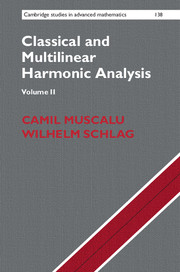Book contents
- Frontmatter
- Contents
- Preface
- Acknowledgements
- 1 Leibnitz rules and the generalized Korteweg–de Vries equation
- 2 Classical paraproducts
- 3 Paraproducts on polydisks
- 4 Calderón commutators and the Cauchy integral on Lipschitz curves
- 5 Iterated Fourier series and physical reality
- 6 The bilinear Hilbert transform
- 7 Almost everywhere convergence of Fourier series
- 8 Flag paraproducts
- 9 Appendix: Multilinear interpolation
- References
- Index
Preface
Published online by Cambridge University Press: 05 February 2013
- Frontmatter
- Contents
- Preface
- Acknowledgements
- 1 Leibnitz rules and the generalized Korteweg–de Vries equation
- 2 Classical paraproducts
- 3 Paraproducts on polydisks
- 4 Calderón commutators and the Cauchy integral on Lipschitz curves
- 5 Iterated Fourier series and physical reality
- 6 The bilinear Hilbert transform
- 7 Almost everywhere convergence of Fourier series
- 8 Flag paraproducts
- 9 Appendix: Multilinear interpolation
- References
- Index
Summary
This is the second volume of our textbook devoted to harmonic analysis. The first volume commenced with the one-dimensional theory of Fourier series, harmonic functions, their conjugates, the Hilbert transform and its boundedness properties. It then moved on to the higher-dimensional theory of singular integrals, the Calderón–Zygmund and Littlewood–Paley theorems, and the restriction theory of the Fourier transform, as well as a brief introduction to pseudodifferential operators via theWeyl calculus. As Vol. I aims for breadth it also includes some basic probability theory and demonstrates how this relates to Fourier analysis. In addition, some application to PDEs are described. For example, in Chapter I.10 we discuss the uncertainty principle and how it allows for a simple proof of the Malgrange–Ehrenpreis theorem on the local solvability of constant-coefficient PDEs. In Chapter 11, which is devoted to restriction phenomenon for the Fourier transform, applications to dispersive evolution equations such as the wave and Schrödinger equations appear in the form of Strichartz estimates.
This second volume is more specialized in the sense that it is entirely devoted to multilinear aspects of singular integrals and pseudodifferential operators. However, at the same time it covers a wide range of topics within that area. By design, each topic is presented within the framework of a few overarching principles. Amongst these the most fundamental notion is that of a paraproduct, and we devote the first three chapters of the present volume to the introduction, motivation, and development of this basic idea.
- Type
- Chapter
- Information
- Classical and Multilinear Harmonic Analysis , pp. ix - xivPublisher: Cambridge University PressPrint publication year: 2013

